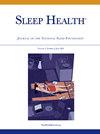有大量酒精使用模式的新生成人睡眠和情绪失调之间的日常相互作用。
IF 3.4
2区 医学
Q2 CLINICAL NEUROLOGY
引用次数: 0
摘要
目的:本研究旨在研究高酒精使用模式的新生成人中睡眠障碍和情绪失调之间的人际双向关联,特别关注情绪失调在一天内的波动和焦虑症状的潜在调节作用。方法:数据来自一项对重度饮酒者(N = 300,女性占65.4%,年龄24.57,范围:21-29)的纵向研究,这些人完成了为期14天的生态瞬时评估,记录了睡眠模式和积极和消极情绪状态,并完成了焦虑症状的先前调查。多层模型被用来探索人与人之间的睡眠(质量和持续时间)和第二天的情绪失调之间的关联,以及情绪失调对当晚睡眠的影响。焦虑的调节作用也被检查。结果:个人分析表明,在睡眠质量高于平均水平的几天内,参与者表现出更好的积极情绪和整体情绪调节,睡眠时间在最佳范围内。人与人之间的分析显示,整体睡眠质量较高的人对负面情绪的调节能力更好。相反,日常情绪失调并不能预测随后的睡眠。焦虑症状缓和了睡眠持续时间和情绪失调之间的非线性(二次型)关联:睡眠时间长于最佳状态与更严重的情绪失调相关,但仅限于焦虑程度较高的个体。结论:这些发现表明睡眠对情绪失调的影响主要是单向的,强调了实现最佳睡眠时间的重要性——特别是对焦虑升高的个体——以及更广泛地改善睡眠质量以减少情绪失调。本文章由计算机程序翻译,如有差异,请以英文原文为准。
The daily interplay between sleep and emotional dysregulation in emerging adults with heavy alcohol use patterns
Objectives
This study aimed to examine within-person, bidirectional associations between sleep disturbances and emotional dysregulation among emerging adults with high alcohol use patterns, with particular attention to within-day fluctuations in emotional dysregulation and the potential moderating role of anxiety symptoms.
Methods
Data are from a longitudinal study of heavy drinkers (N = 300, 65.4% women, Mage 24.57, range: 21-29) who completed a 14-day ecological momentary assessment burst, documenting sleep patterns and positive and negative emotional states, and completed a prior survey on anxiety symptoms. Multilevel modeling was used to explore within- and between-person associations between sleep (quality and duration) and next-day emotional dysregulation, as well as the effect of emotional dysregulation on same-night sleep. The moderating effect of anxiety was also examined.
Results
Within-person analyses showed that participants exhibited better regulation of positive emotion and overall emotion on days following above-average sleep quality, and sleep duration within an optimal range. Between-person analyses revealed that individuals with higher overall sleep quality demonstrated better regulation of negative emotion. In contrast, daily emotional dysregulation did not predict subsequent sleep. Anxiety symptoms moderated the nonlinear (quadratic) association between sleep duration and emotional dysregulation: longer-than-optimal sleep was associated with greater emotional dysregulation, but only among individuals with higher anxiety.
Conclusions
These findings suggest a predominantly unidirectional influence of sleep on emotional dysregulation, emphasizing the importance of achieving optimal sleep duration—particularly for individuals with elevated anxiety—and improving sleep quality more broadly to reduce emotional dysregulation.
求助全文
通过发布文献求助,成功后即可免费获取论文全文。
去求助
来源期刊

Sleep Health
CLINICAL NEUROLOGY-
CiteScore
6.30
自引率
9.80%
发文量
114
审稿时长
54 days
期刊介绍:
Sleep Health Journal of the National Sleep Foundation is a multidisciplinary journal that explores sleep''s role in population health and elucidates the social science perspective on sleep and health. Aligned with the National Sleep Foundation''s global authoritative, evidence-based voice for sleep health, the journal serves as the foremost publication for manuscripts that advance the sleep health of all members of society.The scope of the journal extends across diverse sleep-related fields, including anthropology, education, health services research, human development, international health, law, mental health, nursing, nutrition, psychology, public health, public policy, fatigue management, transportation, social work, and sociology. The journal welcomes original research articles, review articles, brief reports, special articles, letters to the editor, editorials, and commentaries.
 求助内容:
求助内容: 应助结果提醒方式:
应助结果提醒方式:


